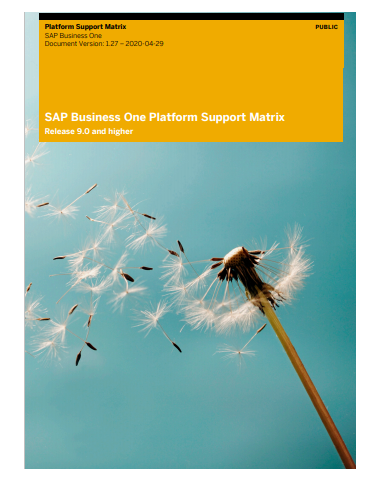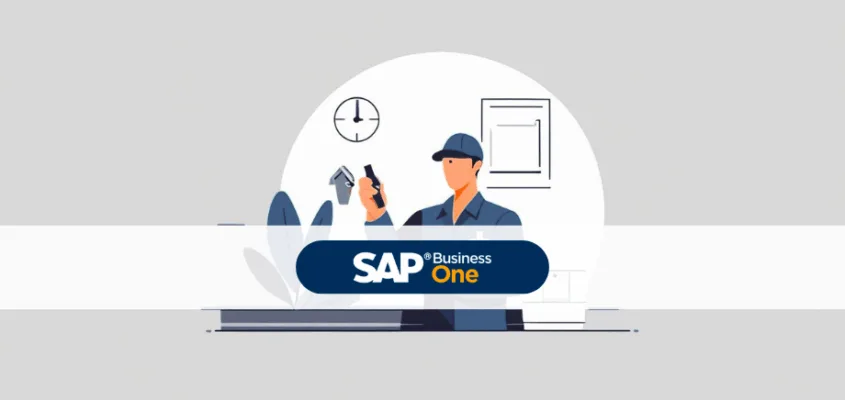When it comes to SAP Business One maintenance, there is often a certain amount of confusion. What is meant by this? And how does it relate to updates and upgrades? We try to clarify.
What is the SAP Business One maintenance?
Integrated business software such as SAP Business One requires a maintenance contract. This is essentially an insurance policy for a company's technology investment. The annual maintenance amounts to 20% of the total licence purchase. It is usually invoiced on a quarterly basis. By purchasing the annual maintenance, you secure access:
The latest technology to prevent old technology from leaving the system behind within software landscapes or in dialogue with other systems.
New capabilities to meet more needs: SAP is constantly improving and introducing new functions in line with the productroad map a.
Legal changes and compliance: SAP puts considerable effort into recognising legal changes as quickly as possible and implementing them in functions accordingly.
Reactive & proactive problem solving: Through software patches or problem escalation to SAP support

When will my version of SAP Business One end of maintenance?
SAP announces the end of maintenance for a version very early on.
Just because one version is no longer maintained, this does not mean that it will no longer run at the end of the mainstream maintenance date. If a version is running properly, it will continue to run properly after the maintenance date. However, it should be noted that any future improvements or software bugs in an old version will not be fixed. The corrections will be made in new versions.
How does my hardware platform affect the SAP Business One upgrade?
SAP publishes a platform support matrix for SAP Business One. This is updated regularly. This matrix shows the server, client, database and desktop platforms that are supported for each version. Sometimes the server, the clients, the Database or the desktops are updated. Only then can SAP Business One be upgraded to a newer version.

SAP B1 platform support matrixIn the platform support matrix you will find a variety of notes and special instructions. Even though SAP Business One CAN run on a server or database that is not listed in the matrix, this does not mean that you should. Just because it runs doesn't mean it's supported. And if there are problems or difficulties on an unsupported platform, SAP can't help you. We strongly recommend choosing an environment that supports SAP and the platform support matrix listed.
How do SAP Business One add-ons affect the upgrade?
Some companies have added add-on solutions to SAP Business One in order to expand the software with additional functions. If you Add ons for SAP Business One, these are an important factor for your upgrade capability. Most add-on developers receive a pre-release version of upcoming versions of SAP Business One. This allows them to test compatibility. However, SAP does not stop or delay major or minor releases because an add-on vendor is not ready - and most add-on vendors are working slightly behind SAP's schedule. You should therefore ensure that the add-on is compatible with the new release compatible before upgrading SAP Business One.
When to update SAP Business One?
This decision should be made in co-operation with the SAP Business One partner. The following points should be checked:
- Is your SAP Business One version no longer maintained?
- Which version do you use?
- What is the latest version of SAP Business One and when was it generally available?
- Have you checked the enhancements and improvements in the latest version?
- What does the product roadmap look like and when is the next version expected to be released?
- Have you checked your platforms to make sure your hardware and database are compatible?
- Have you checked whether all add-on products to SAP Business One that you use are compatible with the new release and the new platforms?
Product Release Upgrades
SAP offers clearly defined upgrade paths for SAP Business One. Direct upgrades from one SAP Business One release to another is normally only supported if the currently installed release and the target release are two consecutive releases (e.g. upgrade from 9.3 to 10.0).
If the currently installed release and the target release are more than one version apart (e.g. 9.1 and 10.0), upgrades may have to be carried out in several steps, depending on technical restrictions.
You can find an overview of the upgrade options in the upgrade strategy for SAP Business One.
Feature Packs and Hotfixes
From the SAP Business One 10.0 version in April 2020, continuous innovations will be provided via SAP Business One 10.0 function packages.
Feature Packages are delivered quarterly and contain new functions, corrections and legal changes.
In exceptional cases, a solution for a specific problem must be delivered outside of the quarterly feature package delivery cycle. The hotfix mechanism enables SAP Business One to deliver the required solution to customers/partners immediately without having to wait for the next feature package delivery.
In very exceptional and rare cases, a hotfix provides a solution to a problem caused by a previous feature pack. This hotfix would be announced through Hot News or other specific rollout communication.
Once a hotfix is applied to the customer's installation to resolve the issue, it is recommended to upgrade to the next regular feature pack after the release, as hotfixes are only provided as temporary solutions. If a hotfix is not applicable to all customers, it is not necessary to install it as the next regular feature pack will contain this hotfix.

Versino Financial Suite V09.2025 for SAP Business One

New features in SAP Business One 10.0 FP 2508

Convert SAP Business One to camt.053 now

Loan postings in SAP Business One

SAP Build Apps for SAP Business One


